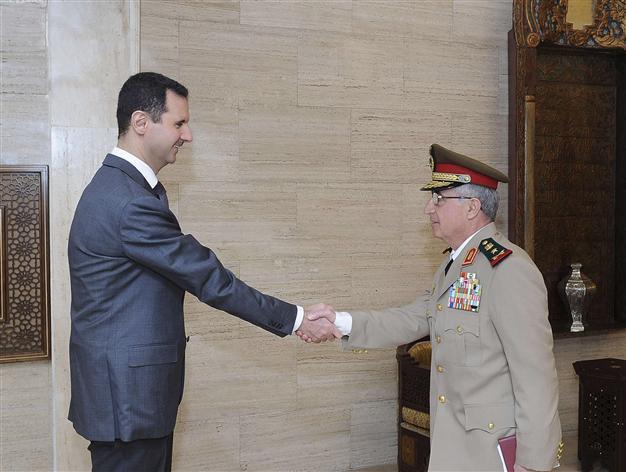Syria allies 'will not allow regime change': Iran official

Syria's President Bashar al-Assad (L) welcomes new Chief of General Staff of the Army and the Armed Forces, General Ali Abdullah Ayyoub, before a meeting in Damascus, in this handout photo distributed July 22, 2012, by Syrian News Agency (SANA). REUTERS/Sana/Handou
A top Iranian military official warned on Tuesday that Syria's allies "will not allow regime change" and would land "decisive blows" on Damascus's enemies if they entered the growing conflict."The Syrian people and the friends of Syria will not allow regime change," Brigadier General Masoud Jazayeri, the deputy chief of Iran's joint armed forces, was quoted as saying on the official website of the Revolutionary Guards, sepahnews.com.
"Neither the friends of Syria nor the (anti-Israel) resistance movement (comprising Iranian, Syrian, Palestinian and Lebanon's Hezbollah forces) have yet entered the scene," he said.
"If they do, they will deliver decisive blows to the enemy front, in particular to the despised Arabs." Iran, ruled by a Shiite clergy, has reacted angrily to the public championing by Sunni rivals Saudi Arabia and Qatar of arming Syria's rebels.
Tehran is the staunchest ally of Syrian President Bashar al-Assad, whose Shiite Alawite-led regime bolsters Iran's anti-Israel politics and provides a conduit for Iranian support for Shiite militant group Hezbollah in Lebanon.
Jazayeri, who frequently voices hardline rhetoric on behalf of Iran's military, said: "The Syrians are very angry with the evil governments of America, Turkey, Qatar, Saudi Arabia and other allies of the terrorists." He charged that the United States and Israel were leading an "all-out campaign against Syria" but were facing a "great defeat".
"Now, the enemy cannot do anything except through terrorist acts, bombings and media propaganda," he was quoted as saying.
Arab and Western governments have repeatedly called for Assad to step down to help calm the raging bloodshed in Syria that human rights monitors say has killed more than 19,000 people since the uprising erupted in March last year.
Fears of violent sectarian splits and a possible proxy war have sharpened since a July 18 bomb blast killed Syria's interior and defence ministers, the head of national security and the chief of the regime's crisis cell.
Iran's government has denied reports in the United States and even in a handful of Iranian outlets in May, citing a Revolutionary Guards commander, that Iranian troops had already been sent to Syria.
















